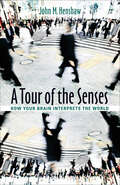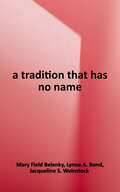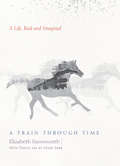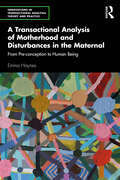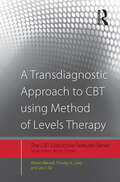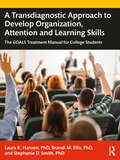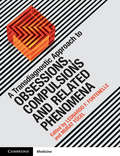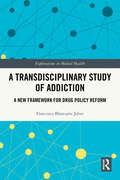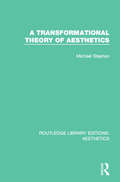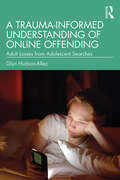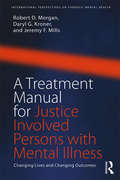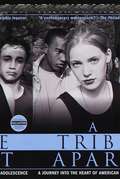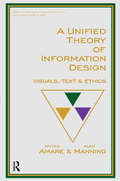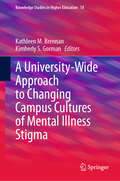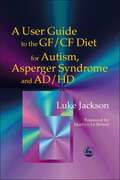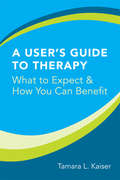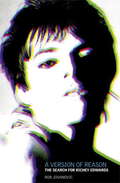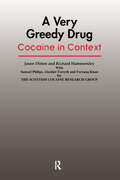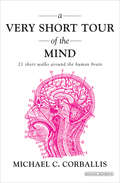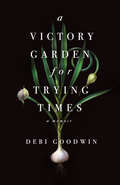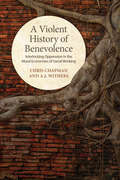- Table View
- List View
A Tour of the Senses: How Your Brain Interprets the World
by John M. Henshaw2012 Outstanding Academic Title, Choice MagazineEver wonder why some people have difficulty recognizing faces or why food found delicious in one culture is reviled in another? John M. Henshaw ponders these and other surprising facts in this fascinating and fast-paced tour of the senses.From when stimuli first excite our senses to the near-miraculous sense organs themselves to the mystery of how our brain interprets senses, Henshaw explains the complex phenomena of how we see, feel, taste, touch, and smell. He takes us through the rich history of sensory perception, dating back to Aristotle’s classification of the five main senses, and helps us understand the science and technology behind sensory research today.A Tour of the Senses travels beyond our human senses. Henshaw describes artificial sensing technologies and instruments, unusual sensory abilities of the animal kingdom, and techniques for improving, rehabilitating, and even replacing sense organs. This entertaining introduction to sensory science is a clever mix of research findings and real-world stories that helps us understand the complex processes that turn sensory stimuli into sophisticated brain responses.
A Tour of the Senses: How Your Brain Interprets the World
by John M. Henshaw“A blend of research findings and real-world anecdotes about people’s sensory experiences enlivens this historical view of the science behind perception.” —Science NewsEver wonder why some people have difficulty recognizing faces or why food found delicious in one culture is reviled in another? John M. Henshaw ponders these and other surprising facts in this fascinating and fast-paced tour of the senses.From when stimuli first excite our senses to the near-miraculous sense organs themselves to the mystery of how our brain interprets senses, Henshaw explains the complex phenomena of how we see, feel, taste, touch, and smell. He takes us through the rich history of sensory perception, dating back to Aristotle’s classification of the five main senses, and helps us understand the science and technology behind sensory research today.A Tour of the Senses travels beyond our human senses. Henshaw describes artificial sensing technologies and instruments, unusual sensory abilities of the animal kingdom, and techniques for improving, rehabilitating, and even replacing sense organs.This entertaining introduction to sensory science is a clever mix of research findings and real-world stories that helps us understand the complex processes that turn sensory stimuli into sophisticated brain responses.“A Tour of the Senses is a fun book, which may be of interest to anyone who’s ever wondered how the eye or ear works.” —American Journal of Human Biology
A Tradition That Has No Name: Nurturing the Development of People, Families, and Communities
by Jacqueline S. Weinstock Mary Field Belenky Lynne A. BondMary Field Belenky, Lynne A. Bond, and Jacqueline S. Weinstock hoping to carry Belenky's theoretical work in the bestselling Women's Ways of Knowing into the realm of everyday life, created the Listening Partners project, designed to help young women isolated in rural poverty give voice to their personal and communal needs and come together to create social change. A Tradition That Has No Name explores this project and the work of other women who have created organizations to give voice to and strengthen traditions of community organizing and leadership, particularly as they have developed in communities of women marginalized by race and class. Ranging across cultures and classes--from struggling inner-city neighborhoods to affluent middle-class suburbs, from African American communities in the South to poor rural communities in Vermont--the book teaches us how to appreciate the ways women create networks of listening and community-building, and how to bring these little-recognized traditions of women's activism to the forefront of public life. It is these "public homeplaces" women create together, the authors argue, that hold the key to empowering communities and creating social change.
A Train through Time: A Life, Real and Imagined
by Elizabeth Farnsworth"It has been a long time since I read a book so moving, plainspoken, and beautiful." —Michael Chabon, Pulitzer Prize winner and author of MoonglowHow much of our memory is constructed by imagination? And how does memory shape our lives? As a nine–year–old, Elizabeth Farnsworth struggled to understand the loss of her mother. On a cross–country trip with her father, the heartsick child searches for her mother at train stations along the way. Even more, she confronts mysteries: death, time, and a locked compartment on the train.Weaving a child’s experiences with memories from reporting in danger zones like Cambodia and Iraq, Farnsworth explores how she came to cover mass death and disaster. While she never breaks the tone of a curious investigator, she easily moves between her nine–year–old self and the experienced journalist. She openly confronts the impact of her childhood on the route her life has taken. And, as she provides one beautifully crafted depiction after another, we share her journey, coming to know the acclaimed reporter as she discovers herself.
A Transactional Analysis of Motherhood and Disturbances in the Maternal: From Pre-conception to Human Being (Innovations in Transactional Analysis: Theory and Practice)
by Emma HaynesGrounded in research and clinical experience and with plenty of case examples, this book provides a relational Transactional Analysis diagnosis and treatment strategy to give immediate relief for maternal mental illness.Maternal mental illness is common, painful, poorly understood, misdiagnosed and often unspoken. For many years this condition has been known as postnatal depression. Yet it is so much more than this with countless women experiencing a multitude of different types of distress in pregnancy and for many years post birth. This book covers not only those conditions commonly known but also explores other factors such as Artificial Reproductive Techniques, miscarriage, termination for fetal abnormality, birth trauma, and infertility and how to treat them. It highlights the true breadth, depth and costs of the maternal journey and emphasises the struggles all parents can experience, no matter where in the world they live.Written in a clear and concise style, this book will be valuable reading for TA psychotherapists and students, and anyone wanting to enlarge their knowledge of motherhood and parenting.
A Transdiagnostic Approach to CBT using Method of Levels Therapy: Distinctive Features (CBT Distinctive Features)
by Warren Mansell Timothy A. Carey Sara J. TaiCognitive Behavioural Therapy (CBT) is the treatment of choice for most mental health problems. Each different problem is usually treated by a different model of CBT. Yet evidence tells us that the same processes are responsible for long term distress in us all. This handy manual draws on evidence and theory to provide the key principles to aid change and recovery. The transdiagnostic approach is supported by a wealth of evidence that processes such as worry, emotion suppression, self-criticism and avoidance maintain distress across psychological disorders. Perceptual Control Theory (PCT) explains all of these processes as forms of ‘inflexible control’, and Method of Levels Therapy (MOL) helps people to let go of these habits. The principles and techniques of MOL are clearly and practically described for clinicians to offer a transdiagnostic CBT that is tailor-made to the goals of each client. This novel volume will be essential reading for novice and experienced CBT therapists, as well as counsellors and psychotherapists. Its accessible explanation of Perceptual Control Theory and its application to real world problems also makes a useful resource for undergraduates, graduates and researchers in psychology.
A Transdiagnostic Approach to Develop Organization, Attention and Learning Skills: The GOALS Treatment Manual for College Students
by Laura K. Hansen Brandi M. Ellis Stephanie D. SmithA Transdiagnostic Approach to Develop Organization, Attention and Learning Skills introduces the GOALS program — an innovative and skill-based approach that addresses the unique array of academic, occupational, and socio-emotional difficulties commonly faced by college students with underdeveloped executive functions. This program consists of ten sessions delivered in a group format to help college students improve their academic performance. Over the course of these sessions, participants learn strategies to prioritize tasks and assignments; schedule and manage life responsibilities; cope with life stressors; identify relevant on-campus resources; prepare for upcoming exams; take well-structured notes; maintain motivation; and several other strategies designed to reach their academic goals. Each session builds on earlier sessions, so previously learned skills lay the foundation for the successful implementation of newly learned skills. This practical and easy-to-implement program includes detailed session notes for group leaders and reproducible handouts for participants including in-session activities, session summaries, and homework assignments. This treatment manual is an essential resource for mental health providers who deliver interventions to students enrolled in post-secondary institutions pursuing undergraduate or graduate level degrees.
A Transdiagnostic Approach to Obsessions, Compulsions and Related Phenomena
by Leonardo F. Fontenelle Murat YücelObsessions, compulsions and related phenomena occur across a wide spectrum of neuropsychiatric disorders. The boundaries between obsessive-compulsive disorder (OCD) and other psychopathological phenomena, such as delusions, impulsions and habits, remain unclear. Further, the subclinical symptoms of OCD are highly prevalent, causing significant impact but yet are poorly understood. To help address these limitations, recent debates have highlighted the importance of a transdiagnostic approach to psychiatry. This book integrates what is currently known about obsessionality, compulsivity and the boundaries of OCD and related disorders and unveils areas that are worthy of future research. Using a transdiagnostic framework, it provides a comprehensive review of the key issues to understanding the diagnosis and evaluation of OCD and related disorders, as well as describing how the clinician can treat OCD and its manifold presentations. Edited by leading specialists in the field, this book offers a global perspective to the diagnosis and treatment of these disorders.
A Transdisciplinary Study of Addiction: A New Framework for Drug Policy Reform (Explorations in Mental Health)
by Francisco Blancarte JaberUsing novel, bioethical framing alongside critical and comprehensive analysis of harm reduction approaches, this cutting-edge book addresses the multifaceted and transdisciplinary issue of drug addiction in society, exploring how addiction can be conceptualized from various disciplinary perspectives for positive policy outcomes.The book discusses the philosophical concepts of agency and action within addiction, and how this can support the foundations needed to identify the most effective and ethical harm reduction strategies within policy frameworks. Foregrounding the implications for this notion of agency, chapters trace the evolution of the concept of addiction through the centuries and examine contemporary understandings from neuroscience, philosophy, bioethics, and policy analysis. Comparative, case study analysis is conducted to contrast local, empirically based models for drug policy in the United Kingdom alongside external models based on international treaties, which dictate a top-down approach to drug penalization.Offering a research-based and theoretically informed framework for effective harm reduction strategies and policies, this book will be of interest to scholars, researchers, and postgraduate students in the fields of addiction studies, bioethics, and mental health policy more broadly. Policymakers working in addictions and substance use may also find the book relevant.
A Transformation Theory of Aesthetics
by Michael StephanThis book develops a theory of picture perception and aesthetic response, arguing that images can generate in us a complex pattern of mental changes, or transformations. It is essential reading to those seriously involved in linking the arts and cognitive sciences.
A Trauma-Informed Understanding of Online Offending: Adult Losses from Adolescent Searches
by Glyn Hudson-AllezThis book examines the contemporary one-size-fits-all model of treatment for sexual offenders and challenges the confrontational approach to working with this group. In recent years, the incidence of people (predominantly men) getting arrested for inappropriate online usage has increased exponentially. This book attempts to understand why this is the case and what can be done to help these individuals and, in turn, reduce the risk of them re-offending. A stand-alone follow-up text from Hudson-Allez’s popular Infant Losses, Adult Searches, this book carries forward the compelling case study of Gordon from the previous text. Throughout his journey from arrest to rehabilitation, the chapters provide insight into the relationship between internet offending and dysfunctional attachments and neurodiversity. Our current understandings of childhood trauma, transgenerational transmission, and diagnoses of autism spectrum disorder and ADHD are all investigated in relation to cases of online offenders and practical therapeutic models are presented. This book is relevant to psychologists, psychotherapists, counsellors and therapists working with forensic clients, and probation officers, social workers and police officers working within child-protection agencies.
A Treatment Manual for Justice Involved Persons with Mental Illness: Changing Lives and Changing Outcomes (International Perspectives on Forensic Mental Health)
by Daryl Kroner Robert D. Morgan Jeremy F. MillsPlease click on the Companion Website link above or visit www.routledge.com/cw/morgan to access the companion workbook, Changing Lives, Changing Outcomes: A Treatment Program for Justice-Involved Persons with Mental Illness. A Treatment Manual for Justice Involved Persons with Mental Illness comprises a comprehensive and structured treatment manual that provides clinicians a guide for treating justice involved persons with mental illness. The manual includes a treatment plan for each session with specific structured exercises (for both in-group and out of group work) designed to teach objectives each session. The program incorporates a psychosocial rehabilitation model, social learning paradigm and cognitive-behavioral model for change, although cognitive behavioral theory is more prevalent and apparent throughout the manual. Additional training on Changing Lives and Changing Outcomes: A Treatment Program for Justice-Involved Persons with Mental Illness is available at https://www.gifrinc.com/clco.
A Tribe Apart: A Journey into the Heart of American Adolescence
by Patricia HerschFor three fascinating, disturbing years, writer Patricia Hersch journeyed inside a world that is as familiar as our own children and yet as alien as some exotic culture--the world of adolescence. As a silent, attentive partner, she followed eight teenagers in the typically American town of Reston, Virginia, listening to their stories, observing their rituals, watching them fulfill their dreams and enact their tragedies. What she found was that America's teens have fashioned a fully defined culture that adults neither see nor imagine--a culture of unprecedented freedom and baffling complexity, a culture with rules but no structure, values but no clear morality, codes but no consistency.Is it society itself that has created this separate teen community? Resigned to the attitude that adolescents simply live in "a tribe apart," adults have pulled away, relinquishing responsibility and supervision, allowing the unhealthy behaviors of teens to flourish. Ultimately, this rift between adults and teenagers robs both generations of meaningful connections. For everyone's world is made richer and more challenging by having adolescents in it.
A Troubled Guest: Life and Death Stories
by Nancy MairsFew have succeeded so well in illuminating the paradox of living with the reality of death as essayist Nancy Mairs in this unflinching look at assisted suicide, the death penalty, and other life-and-death decisions.
A Unified Theory of Information Design: Visuals, Text and Ethics (Baywood's Technical Communications)
by Alan Manning Nicole AmareCommunicative visuals, including written text, have a diverse range of forms and purposes. In this volume, the authors show that it is possible to both describe and explain the major properties of diverse visual-communication forms and purposes within a common theoretical framework of information design and ethics. For those unaccustomed to thinking of written text as a visual form belonging to the same general class as other visual forms (colour, texture, shape, imagery, etc.), consider how a text's readability suffers if we remove all white space and punctuation, which can be identified as visual signals of the same subtype as grid lines and bullet points, dividing and calling attention to adjacent information. The authors identify deep connections between foundational visual design elements and the grammar of language itself. No physicist or chemist today questions the value of a single theory that describes and explains a wide variety of phenomena, but oddly enough, the authors have frequently been asked why they are interested in advancing a unified theory of visual communication. The simplest answer is: to treat visual communication as a science, and seeking unified theories is just what science does. In more practical terms, a unified approach to visual communication allows us to teach visual design students relatively few things that will enable them to do relatively many things.
A University-Wide Approach to Changing Campus Cultures of Mental Illness Stigma (Knowledge Studies in Higher Education #18)
by Kathleen M. Brennan Kimberly S. GormanThis interdisciplinary volume addresses the progress made regarding mental illness stigma in the realm of higher education while acknowledging how stigma has transformed to present more subtle challenges in this context and how it may be addressed to promote positive campus outcomes. Written by researchers and practitioners who representdifferent fields within higher education, it highlights the existence of stigma by focusing on its presence in the curriculum, in policies, and in processes within the university. It discusses both the presence and impact of stigma in undergraduate and graduate studies, athletics, and faculty and staff. The book emphasizes a collaborative approach to involve stakeholder groups across campus by providing practical, preemptive solutions to reduce stigma. This volume can be used as a practical guide for any institution of higher educationwishing to address mental illness stigma on their campus in a strategic, systemic manner. Additionally,it will be helpful for individuals working in higher education as a guide for reflecting on and changing their individual practice.This book greatly appeals to those who are interested in addressing mental illness stigma systemically.
A User Guide to the GF/CF Diet for Autism, Asperger Syndrome and AD/HD
by Luke Jackson Marilyn Le BretonWhat is the GF/CF diet? Does it work? What's it like to go on it? In this user guide to the gluten and casein free diet, Luke Jackson, who is 12 years old and has Asperger Syndrome, tells you everything you need to know - both good and bad. The details of his first-hand experience of the diet show how it has improved the quality both of his own life and that of other members of the family. Jacqui Jackson, Luke's mother, decided to try the diet for Luke and his two brothers - Joe who has AD/HD and Ben who has autism - and found the results to be highly rewarding: as Luke says, the diet `really can change people's lives'. Luke offers practical advice on topics such as what to expect when beginning the diet, tips for how to alleviate any initial discomfort, through to advice on how to rearrange the kitchen to avoid-cross contamination. The book includes quotes from other members of the family, a chapter by Luke's mother on how to cope with the challenges of cooking for a family where some people are on the diet and others are not, along with a selection of the family's favourite recipes. An extensive list of useful addresses and websites of suppliers, a food diary for an average week, and suggestions for packed lunches are also included, making the book a really practical source of information. Luke's message is one of unfailing encouragement. Despite the downsides, he and his family have no regrets about going on the diet. This positive and honest book is an important source of encouragement and advice for people whose lives are touched by autism, AS or AD/HD, for parents considering implementing the diet with their children, and for anyone on the diet, young or old.
A User's Guide to Therapy: What to Expect and How You Can Benefit
by Tamara L. KaiserA guidebook to understanding and getting the most out of therapy. This book is for clients--and for clinicians to recommend to their clients--who want to enhance the process of psychotherapy and get the most out of a therapeutic relationship. Kaiser writes in a friendly, accessible tone, and explains what exactly therapy is and how it works, including the beginning, middle, and ending stages of the therapy process. She elaborates on the dynamics of the relationship between therapist and client, including such issues as power, boundaries, trust, and termination, and describes the four common factors of change: the client, the therapeutic relationship, hope, and technique. Furthermore, she explains the basic aspects of brain development and how psychotherapy physically changes the brain. This book familiarizes potential clients with four major therapeutic approaches--psychodynamic, developmental, cognitive- behavioral, and humanistic--and explains the characteristics of individual, family, and group therapy. Through case studies, Kaiser reveals the healing potential of the therapeutic relationship, including the experience of being deeply understood by and coming to trust a therapist. Kaiser offers much food for thought, as well as compassion, wisdom, encouragement, and practical suggestions for those who choose to take this fascinating and fruitful journey.
A Version of Reason: The Search for Richey Edwards
by Rob JovanovicThe missing Manic - an authoritative look into the life and times of Richey Edwards, the Manic Street Preachers' guitarist who disappeared in 1995.The disappearance of Richey Edwards, troubled guitarist with the Manic Street Preachers, is one of rock and roll's great unresolved mysteries. His Vauxhall Cavalier was found abandoned in a service station car park near the Severn Bridge, a notorious suicide spot, in February 1995, a fortnight after Edwards had last been seen. The location of the car and the tape left in the deck - Nirvana's album In Utero - tended to point to one conclusion. However, it almost seemed too obvious a statement, and in A VERSION OF REASON, Rob Jovanovic unravels the complicated life and final days of Richey Edwards. Piecing together testimony from those close to Edwards Jovanovic seeks to produce an authoritative account of the life and times of Richey Edwards.
A Version of Reason: The Search for Richey Edwards
by Rob JovanovicThe missing Manic - an authoritative look into the life and times of Richey Edwards, the Manic Street Preachers' guitarist who disappeared in 1995.The disappearance of Richey Edwards, troubled guitarist with the Manic Street Preachers, is one of rock and roll's great unresolved mysteries. His Vauxhall Cavalier was found abandoned in a service station car park near the Severn Bridge, a notorious suicide spot, in February 1995, a fortnight after Edwards had last been seen. The location of the car and the tape left in the deck - Nirvana's album In Utero - tended to point to one conclusion. However, it almost seemed too obvious a statement, and in A VERSION OF REASON, Rob Jovanovic unravels the complicated life and final days of Richey Edwards. Piecing together testimony from those close to Edwards Jovanovic seeks to produce an authoritative account of the life and times of Richey Edwards.
A Very Greedy Drug: Cocaine in Context
by Richard Hammersley Jason DittonFirst Published in 1997. This book sketches the recent history of the panic over cocaine in Britain, before reporting in-depth research on more than a hundred users in Scotland. This group contained all types of users, from casual users to heavy users who had cut down without problems, to people with multiple drug problems. The book considers why some people can give up cocaine and others become addicted. It compares British users with those elsewhere in the world, showing that the effects are similar everywhere -- cocaine does not addict most of its users. The picture of drug use obtained from addicts in clinics is a distorted one. Cocaine use in Britain has caused much concern but its extent has been unknown. Users are still quite affluent, but when cocaine hits street level -- as it is predicted to do in the late 1990s -- problems are likely to increase.
A Very Short Tour of the Mind: 21 Short Walks Around the Human Brain
by Michael C. Corballis&“Thoroughly enjoyable&” essays from a cognitive neuroscientist, filled with surprising facts (Kirkus Reviews, starred review). Modern computers might be faster, and whales might have larger brains, but neither can match the sheer intellect or capacity for creativity that the human mind enjoys. It is arguably the most complex organ in the universe. If you&’ve ever wondered why your dog can remember where it buried its bone but you can&’t find your keys, or whether it&’s true that we use only ten percent of our brainpower, this concise book offers some answers—and introduces us to what science has learned about the intricacies of the human brain over the last fifty years. Leading us through behavioral experiments and neuroscience, cognitive theory and Darwinian evolution, Michael Corballis punctures a few hot-air balloons, and explains just what we know—and don&’t know—about our own minds. &“Poses questions we wouldn&’t have thought to ask and then answers them with clarity and wit.&” —American Scientist
A Victory Garden for Trying Times
by Debi Goodwin“A compelling and intimate reflection on love and grief and ordinary things that comfort and sustain us.” — Alison Smith, award-winning journalist Ever since her childhood on a Niagara farm, Debi has dug in the dirt to find resilience. But when her husband, Peter, was diagnosed with cancer in November, it was too late in the season to seek solace in her garden. With idle hands and a fearful mind, she sought something to sustain her through the months ahead. She soon came across Victory Gardens — the vegetable gardens cultivated during the world wars that sustained so many. During an anxious winter, she researched, drew plans, and ordered seeds. In spring, with Peter in remission, her garden thrived and life got back on track. But when Peter's cancer returned like a killing frost, the garden was a reminder that everything must come to an end. A Victory Garden for Trying Times is a personal journey of love, loss, and healing through the natural cycles of the earth.
A Vida É Maravilhosa: O Caminho para Uma Vida Mais Significativa
by Frank MartelaUm guia inspirador que oferece ferramentas práticas e facilmente aplicáveis para uma experiência de vida mais positiva, gratificante e significativa. O que dá sentido à nossa vida? Como podemos lidar com a ausência de um propósito existencial? Valerá a pena focarmo-nos na busca permanente de felicidade? Perceber o sentido da própria existência é fundamental para vivermos com motivação, satisfação e alegria e, sobretudo, para conseguirmos tirar o máximo partido da vida. Vários estudos sugerem que as pessoas com uma forte noção do seu propósito existencial têm mais saúde e vivem mais e melhor. Neste livro, Frank Martela esclarece por que motivo sentimos uma insatisfação permanente e estamos constantemente à procura de algo mais. Numa série de reflexões perspicazes e motivadoras, dotadas de um refinado sentido de humor, o autor analisa as grandes questões existenciais no contexto da vida moderna, oferecendo uma nova abordagem para alcançarmos uma vida mais plena, que passa por fazermos coisas significativas para nós (realização pessoal)de uma forma que nos torne significativos para outras pessoas (realização social). «Um livro para ler vezes sem conta na viagem de descoberta do nosso propósito.» Daniel H. Pink, autor bestseller internacional «Apoiando-se habilmente em áreas como a psicologia, a filosofia e a literatura, este livro irá ajudá-lo a viver uma vida com significado. Uma leitura tão gratificante e divertida quanto enriquecedora.» Emma Seppala, diretora científica do Centro de Educação e Pesquisa sobre Compaixão e Altruísmo da Universidade de Stanford «Um livro brilhante e encantador que aborda as questões mais grandiosas da vida com simplicidade, humor e perspicácia. Se tem curiosidade sobre o sentido da vida — e quem não tem? —, este livro é um recurso valioso.» Roy F. Baumeister, autor bestseller internacional «Neste ensaio edificante, fruto de um cuidadoso trabalho de pesquisa, Frank Martela reúne algumas das ideias mais fascinantes da história, da filosofia e da psicologia para abordar a questão mais premente de todas: o que torna a vida significativa.» Emily Esfahani Smith, autora bestseller internacional
A Violent History of Benevolence: Interlocking Oppression in the Moral Economies of Social Working (G - Reference, Information and Interdisciplinary Subjects)
by Chris Chapman A.J. WithersA Violent History of Benevolence traces how normative histories of liberalism, progress, and social work enact and obscure systemic violences. Chris Chapman and A.J. Withers explore how normative social work history is structured in such a way that contemporary social workers can know many details about social work’s violences, without ever imagining that they may also be complicit in these violences. Framings of social work history actively create present-day political and ethical irresponsibility, even among those who imagine themselves to be anti-oppressive, liberal, or radical. The authors document many histories usually left out of social work discourse, including communities of Black social workers (who, among other things, never removed children from their homes involuntarily), the role of early social workers in advancing eugenics and mass confinement, and the resonant emergence of colonial education, psychiatry, and the penitentiary in the same decade. Ultimately, A Violent History of Benevolence aims to invite contemporary social workers and others to reflect on the complex nature of contemporary social work, and specifically on the present-day structural violences that social work enacts in the name of benevolence.
